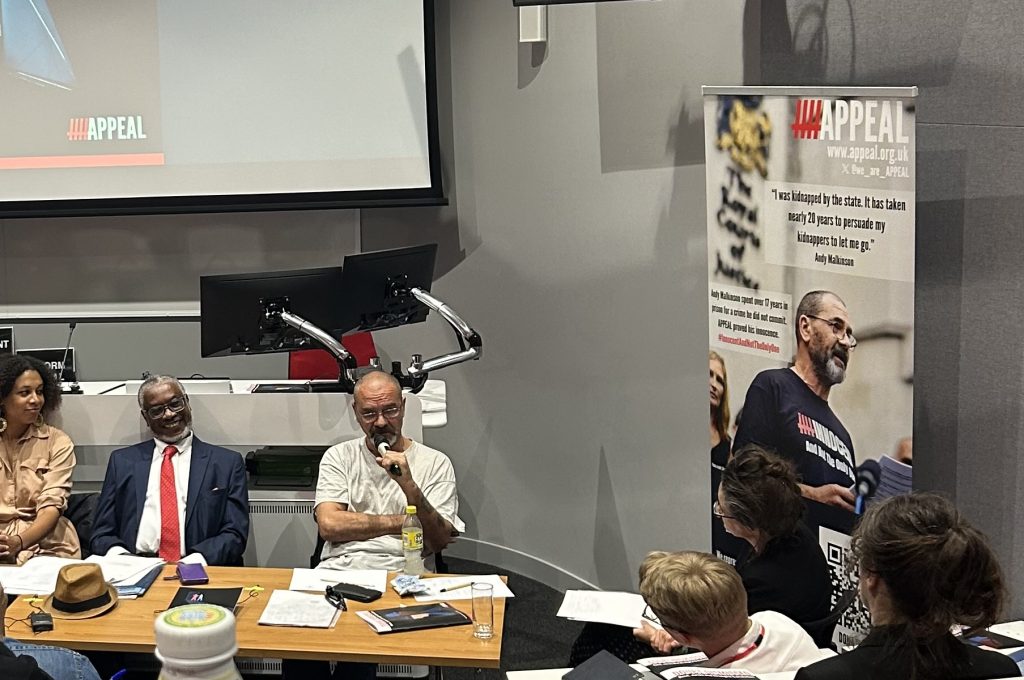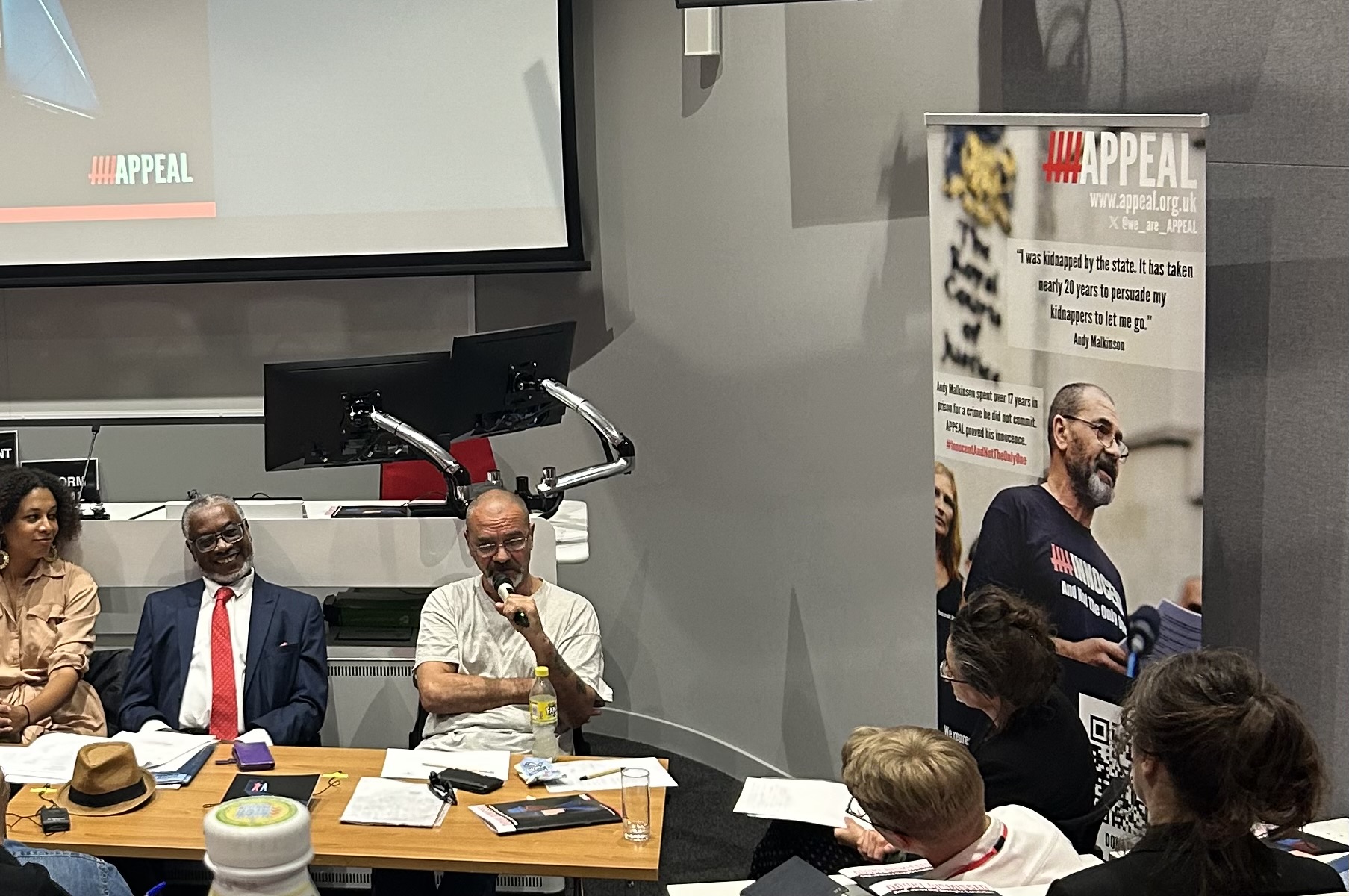Andrew Malkinson has attacked the ‘racist’ jury system which he blamed for his own wrongful conviction at the launch of a report calling for the reinstatement of jury unanimity. The legal charity APPEAL has identified at least 56 wrongful convictions in which there has been a split verdict including Winston Trews and Dr David Sellu, who both spoke at the event, as well as Sally Clark, Stefan Kiszko, Michael O’Brien and Barry George.
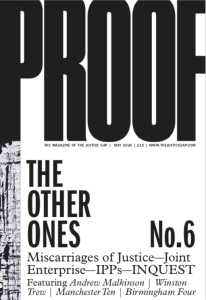 Andrew Malkinson, who had his conviction overturned last summer, was wrongfully imprisoned for 17 years after being convicted of rape in 2004 on a 10/2 verdict. ‘That should be taken into account – that’s 17% of the entire jury,’ he said. ‘That’s not good enough to get a life sentence.’ He argued that if it hadn’t been for majority verdicts he would not have been convicted. ‘It wouldn’t have been permissible,’ he said. ‘I would have had a normal life and not had 20 years’ fighting to get at the truth whilst certain state actors deliberately withheld evidence and indeed manufactured evidence and folks witnesses.’
Andrew Malkinson, who had his conviction overturned last summer, was wrongfully imprisoned for 17 years after being convicted of rape in 2004 on a 10/2 verdict. ‘That should be taken into account – that’s 17% of the entire jury,’ he said. ‘That’s not good enough to get a life sentence.’ He argued that if it hadn’t been for majority verdicts he would not have been convicted. ‘It wouldn’t have been permissible,’ he said. ‘I would have had a normal life and not had 20 years’ fighting to get at the truth whilst certain state actors deliberately withheld evidence and indeed manufactured evidence and folks witnesses.’
The report by APPEAL’s Naima Sakande and Nisha Waller argues that majority verdicts – supposedly a safeguard against jury bias – have had negative impact on the quality of decision-making, eroded the principle of reasonable doubt and increased the risk of wrongful convictions. The report for the first time reveals the problematic origins of majority verdicts which were introduced in 1967 against ‘a backdrop of racism and anti-racist resistance’.
- You can read Nisha Waller in PROOF magazine on her research
- Also in PROOF, Winston Trew on the racist police officer who fitted him up and Emil Dugan interviews Andrew Malkinson
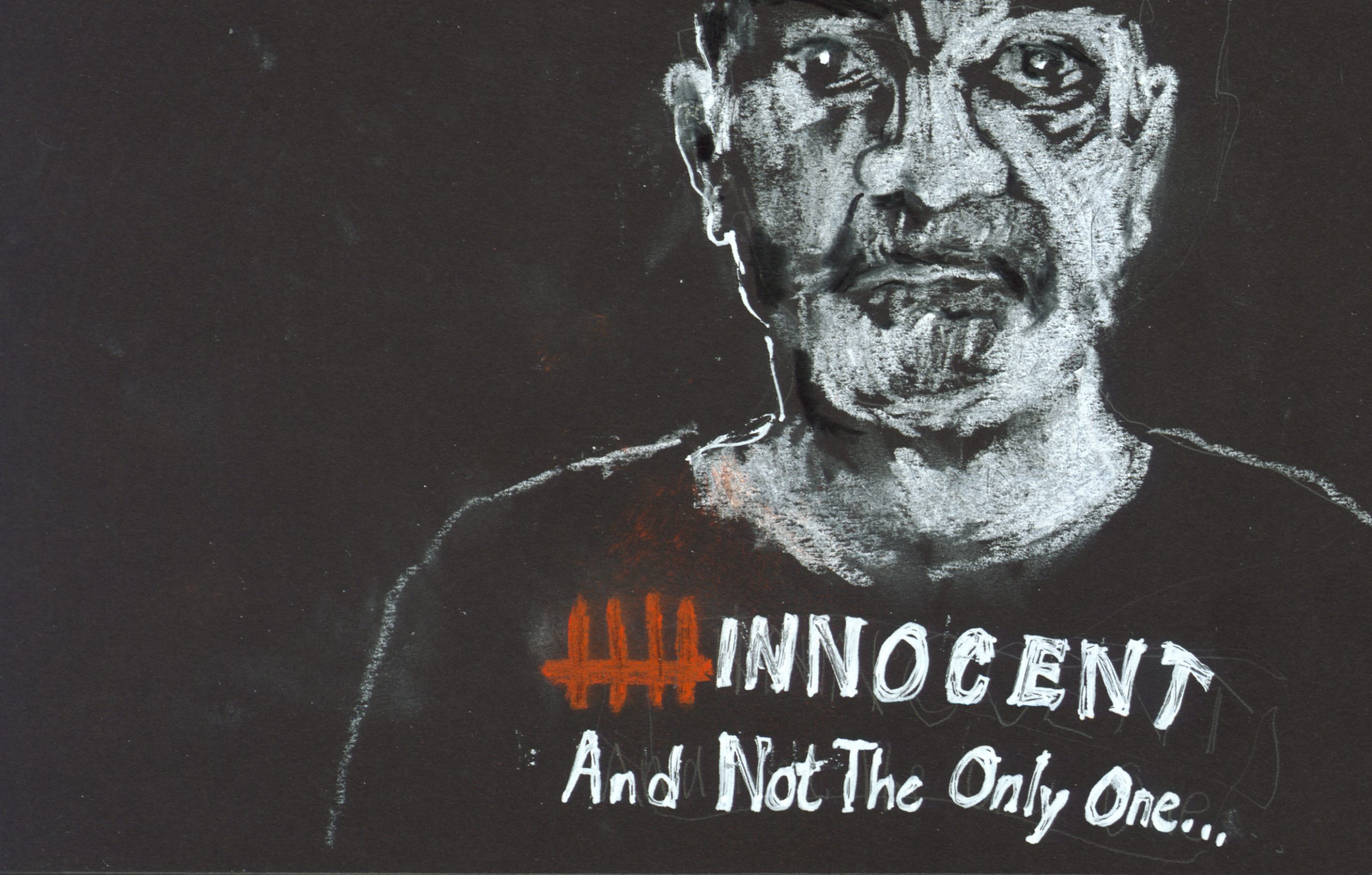 Sakande and Waller draw on contemporary archival research and, in particular, the 1963 Morris committee which, for the first time, raised the possibility of revisiting majority verdict after a centuries-old requirement for a unanimous agreement. ‘Much of the written evidence highlighted concerns that an expanded jury pool which included the ‘laboring classes’, immigrants, and ‘coloureds’ would taint the ‘calibre’ of decision-making and educational attitude necessary for jury duty,’ they wrote. The Morris committee was launched to look into juror eligibility over concerns about the impact of property re-evaluations increasing the jury pool by as much as 4.7 times in certain areas and whether that would ‘reduce the quality of juries’.
Sakande and Waller draw on contemporary archival research and, in particular, the 1963 Morris committee which, for the first time, raised the possibility of revisiting majority verdict after a centuries-old requirement for a unanimous agreement. ‘Much of the written evidence highlighted concerns that an expanded jury pool which included the ‘laboring classes’, immigrants, and ‘coloureds’ would taint the ‘calibre’ of decision-making and educational attitude necessary for jury duty,’ they wrote. The Morris committee was launched to look into juror eligibility over concerns about the impact of property re-evaluations increasing the jury pool by as much as 4.7 times in certain areas and whether that would ‘reduce the quality of juries’.
The report quotes one conservative MP in a parliamentary debate at the time expressing concerns about an English ‘nobleman’ being judged by ‘common clay’; as well as a submission from the Superintendents’ Association of the Police Forces of England and Wales arguing that a member of a jury ‘should not only be a British subject, but should also have been born in this country’.
Winston Trew, a Black rights activist, was wrongly convicted in 1972 as a result of the actions of a racist police officer (DS Derek Ridgewell) and despite two dissenting jurors. He pointed out that there were two Black jurors and he was convicted (as one of the Oval Four) in the midst of a racist media scare about ‘Black muggings’. ‘Had majority verdicts not been in place, I would not have been convicted in 1970 for crimes I did not commit,’ he said. ‘Consequently, I wouldn’t have spent 47 years, most of my adult life, trying to clear my name eventually succeeding 2019.’
David Sellu worked as consultant surgeon for 30 years before being convicted of gross negligent manslaughter in 2013 on a 10/2 majority verdict. ‘I believe I did my best to save countless lives,’ he said. ‘Nevertheless, a patient died under my care, as often happens in hospitals, in 2010 for reasons completely not my fault.’ He had his conviction overturned in 2016.
Dr Sellu went on to argue ‘one of the problems’ with an adversarial justice system is that ‘it blames rather than allows for learning’. ‘How can 12 people who have never made life and death decisions, like I had to every day, put themselves in my position and imagine what I knew or should have known?’ he asked.
Winston Trew argued that majority verdicts operated as ‘a sort of a dragnet’. He quoted the famous words of the English jurist William Blackstone that it is better than 10 guilty persons escape than one innocent person suffer. ‘That’s been reversed,’ he said. ‘It’s now the case that it’s better the 10 innocent people suffer than one guilty person go free. Majority verdicts make sure that everyone is found guilty and then they can sorted out after the trial when they appeal. Majority verdicts, as far as I’m concerned, wreck people’s lives.’
Andrew Malkinson was asked if he backed APPEAL’s call for a reinstatement of juror unanimity. ‘I totally agree,’ he replied. ‘It’s it was a massive mistake to do what they did in 1967. It was clearly a racist decision.’
‘When you’re in the dock facing the jury, it is terrifying. Even when you know you’re innocent, it’s terrifying. Your whole life is in these 12 strangers’ hands. They don’t know you from Adam. And they’ve only got what the police and the prosecution give them to rely on to make an informed decision and they can’t make an informed decision when there is deceit, engineering of false witnesses and withholding disclosure. That’s not possible.’
Andrew Malkinson
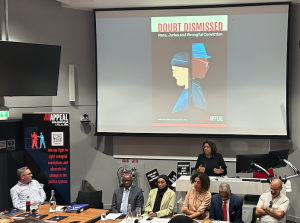 Four years ago, the Supreme Court in the US outlawed majority verdicts in recognition of their racist origins. Professor Angela Allen-Bell (left), who drafted a submission in the case of Ramos v Louisiana, spoke at the event. She pointed to research indicating that 80% of wrongful convictions resulted from non-unanimous juries.
Four years ago, the Supreme Court in the US outlawed majority verdicts in recognition of their racist origins. Professor Angela Allen-Bell (left), who drafted a submission in the case of Ramos v Louisiana, spoke at the event. She pointed to research indicating that 80% of wrongful convictions resulted from non-unanimous juries.
Prof Allen-Bell explained how non-unanimous juries were introduced first in Louisiana in 1898 with ‘very, very bad intentions’ and as a response to the end of chattel slavery. ‘The South simply could not contend with the notion that white folks would have to now do their own labour, that they would have to pay somebody to do the stuff that people were doing for free,’ she said. Non unanimous juries allowed for ‘swift convictions’ to replace ‘the free labour system’, that threatened by the abolition of slavery however only to be ‘replaced with convict leasing’.
She argued that a requirement of unanimity had a qualitative impact on decision-making ‘slowing the process down’; whereas majority verdicts speeded the process up. She listed by name prisoners serving time in Angola state penitentiary which, she pointed out, is ‘a former plantation’ who were sentenced for life after the jury deliberated for less than an hour – for example, Kenny ‘Zulu’ Whitmore who is almost half a century into a life sentence after a jury deliberated for less than 33 minutes.
Support the Justice Gap, buy Proof
